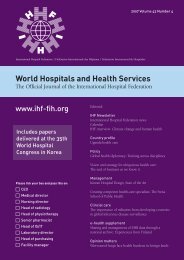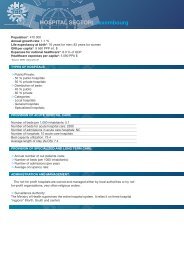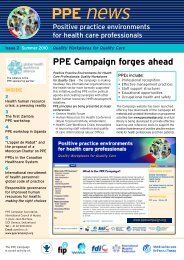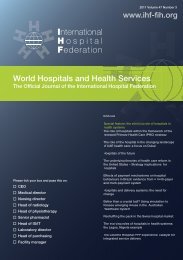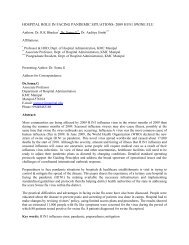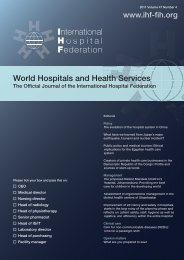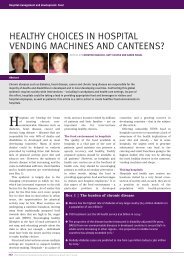World Hospitals and Health Services - International Hospital ...
World Hospitals and Health Services - International Hospital ...
World Hospitals and Health Services - International Hospital ...
Create successful ePaper yourself
Turn your PDF publications into a flip-book with our unique Google optimized e-Paper software.
OPINION MATTERS<br />
Major international<br />
concerns for 2005<br />
GÉRARD VINCENT<br />
DIRECTOR GENERAL, FRENCH HOSPITAL FEDERATION, PRESIDENT OF HOPE (EUROPEAN FEDERATION OF<br />
HOSPITALS AND HEALTH CARE) AND PRESIDENT DESIGNATE, INTERNATIONAL HOSPITAL FEDERATION<br />
The year 2004 ended on quite a sad note. The UNICEF<br />
report on child health reminded us of the toll still paid<br />
by children today. At the same time, AIDS is following<br />
its upward trend along with other major communicable<br />
diseases. And wars <strong>and</strong> violence are still in the picture. On<br />
the other side of the coin, hospitals <strong>and</strong> their professionals<br />
are deeply involved in giving care <strong>and</strong> hope more than ever<br />
before. The next <strong>International</strong> <strong>Hospital</strong> Federation Congress<br />
‘<strong><strong>Hospital</strong>s</strong> <strong>and</strong> their Challenges’ (20–22 September 2005 in<br />
Nice, France) will keep this paradox at its very core.<br />
In fact, there is no time for pessimism in our ever active<br />
wards <strong>and</strong> we know that listing out the difficulties we are<br />
facing is already a start in solving them. Two recent<br />
developments among others are showing strong signs at<br />
international level. Patient safety is one of them. An<br />
estimated one in ten patients worldwide becomes sick, is<br />
injured or even dies as a result of the healthcare they receive,<br />
although many of these adverse events in healthcare delivery,<br />
including medical errors, are preventable. To combat this<br />
problem <strong>and</strong> improve patient safety, global health leaders<br />
<strong>and</strong> the <strong>World</strong> <strong>Health</strong> Organization (WHO) have launched<br />
the <strong>World</strong> Alliance for Patient Safety in October 2004. This<br />
is the first time that a coalition of partners has joined efforts<br />
to act globally to improve patient safety.<br />
The second one concerns the migration of health<br />
professionals. Employers <strong>and</strong> recruitment agencies in several<br />
wealthy countries are actively recruiting doctors <strong>and</strong> nurses<br />
from other parts of the world. But there is now a real<br />
concern about the ‘brain drain’ in the health sector <strong>and</strong><br />
its consequences for population health. Charters,<br />
recommendations <strong>and</strong> rules are beginning to flourish aimed<br />
at promoting good recruitment practice <strong>and</strong> also to say that<br />
Employers <strong>and</strong> recruitment<br />
agencies in several wealthy<br />
countries are actively<br />
recruiting doctors <strong>and</strong><br />
nurses from other parts of<br />
the world.<br />
“<br />
”<br />
attention should be focused on retaining nurses rather than<br />
recruiting nurses from abroad.<br />
At the European level, hospitals are increasingly<br />
influenced by the European Union decisions. Mutual<br />
recognition of diplomas, public procurement regulations,<br />
EU drug policy <strong>and</strong> safety regulations, have among other<br />
things made a strong impact. <strong>Health</strong> was already present in<br />
“<br />
An exp<strong>and</strong>ing agenda of cooperation<br />
<strong>and</strong> cross-border<br />
contacts in the healthcare<br />
field is also increasing with<br />
European integration.<br />
”<br />
the EU treaties because a high level of human health<br />
protection has to be ensured in the definition <strong>and</strong><br />
implementation of all Union policies <strong>and</strong> actions. But now<br />
Europe will have a Constitution in which for the first time<br />
ever health care will be clearly included.<br />
An exp<strong>and</strong>ing agenda of co-operation <strong>and</strong> cross-border<br />
contacts in the health care field is also increasing with<br />
European integration. As health systems become more <strong>and</strong><br />
more interdependent, the process of adaptation needed by<br />
health issues cannot take place solely at national level. The<br />
enlargement of the Union from 380 million to 450 million<br />
citizens is opening new perspectives. It takes place at a time<br />
when all European countries will have to adapt to numerous<br />
challenges, whereas c<strong>and</strong>idate countries will look to the<br />
Community for advice <strong>and</strong> help in rebuilding their health<br />
systems, many of which are struggling to survive.<br />
In this context, France is now concluding, what is<br />
nowadays a recurring event for all systems, a series of major<br />
healthcare reforms. For hospitals, the progressive change of<br />
financing from a global envelop system to DRG-based<br />
financing is the most innovative element. More generally,<br />
confronting the lack of doctors <strong>and</strong> nurses, France has<br />
revised the number of medical students but is also looking<br />
00 | <strong>World</strong> <strong><strong>Hospital</strong>s</strong> <strong>and</strong> <strong>Health</strong> <strong>Services</strong> | Vol.40 Vol. No.2 40 No. 4 | <strong>World</strong> <strong><strong>Hospital</strong>s</strong> <strong>and</strong> <strong>Health</strong> <strong>Services</strong> | 47



